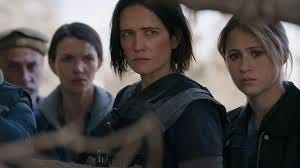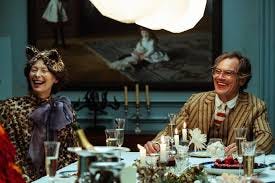Cannon Fodder
My thoughts on Dirty Angels, The End and Kraven the Hunter
From its resoundingly basic premise (a commando unit comprised almost entirely of female soldiers posing as relief workers turn up in Afghanistan on a mission to rescue a group of schoolgirls who have been kidnapped and put up for ransom by terrorists, battling members of ISIS and the Taliban along the way) to the cut-rate battle scenes to a tone that veers wildly between the blatantly xenophobic and the oddly jokey, Dirty Angels often feels like a conscious attempt to emulate the feel of the cheesy exploitation films that the former Cannon Films used to crank out with astonishing regularity back in the 80s before they fell apart in a haze of overreaching ambitions, financial mismanagement and dueling lambada films. Those movies, outside of having a certain camp value due to their sheer weirdness, were pretty crappy of course but since they tended to find filmmakers on the level of Joseph Zito and Albert Pyun putting the likes of Chuck Norris or Michael Dudikoff through their paces, most sensible moviegoers could hardly be that upset or annoyed when they proved to be terrible. In the case of this film, however, there are people of real talent involved—director Martin Campbell helmed two of the better latter-day James Bond films in Goldeneye and Casino Royale and the cast includes the gifted likes of Eva Green and Maria Bakalova—and to see them treading artistic water in something as forgettable as this is kind of depressing. Green’s efforts to bring a certain degree of gravitas to the material are largely wasted in a film that inexplicably tries to lighten the mood at times with a bizarre running joke over people mispronouncing her character’s alias, Jessica Rabit, while Bakalova is wasted so completely that even Ruby Rose, as another member of the group, ends up making more of an impact. Campbell tries to keep things moving along but the action beats are fairly pedestrian and notable only for the globs of wildly unconvincing CGI gore that splatter around from time to time. Dismal, dull and depressing in equal measure, Dirty Angels is generic filmmaking at its most desultory and the fact that it appears to be setting up a sequel in its final moments must rank as one of the most notable bits of self-delusion that you will see (not that you actually going to see this thing) to appear in a film this year
.If Dirty Angels is a film that seems to have been made with no discernible amount of actual ambition, then The End, the feature film debut from documentarian Joshua Oppenheimer, is positively teeming with during every moment of its 2 1/2 hour running time, though it all proves to be wildly misguided by the time that all is said and done. Set 20 years after the end of mankind brought on by environmental catastrophe, the film takes place entirely within the confines of a massive salt mine where what may be the last family on Earth, consisting of a one-time energy tycoon (Michael Shannon), his one-time dancer wife (Tilda Swinton and their son (George MacKay), continue to live a life of relative luxury with a loyal retinue consisting of a butler (Tim McInnery), a doctor (Lennie James), an old family friend (Bronagh Gallagher) and countless priceless works of art. Because the son has never known life outside of the mine, he remains susceptible to the self-serving tales that his parents regale about life back then, from his mother’s dubious claims that she danced with the Bolshoi to his father’s belief that the fracking that he made a fortune off of had absolutely nothing to do with the climate crisis that helped destroy their world while making him billions. Therefore, it comes as a jolt to him when an outside turns up in the form of a young woman (Moses Ingram) who has managed to survive on the outside but who lost her own family in the process. While his mother wants to send the newcomer right back out—darkly intimating that the family may have done that and worse in the past when people would arrive seeking shelter—his father allows her to stay (if only to supply a new audience for the autobiography that he is still penning) but as time goes on and she begins to open the son’s eyes as to the stories that he has been told, the entire dynamic of the group begins to spin out of control. Oh, did I forget to mention that in addition to all of this, the film is also a full-scale musical?
In his audacious documentaries The Act of Killing and The Look of Silence, Oppenheimer used bold and sometimes troubling cinematic conceits to tell stories of members of one-time members of oppressive ruling classes confronting the crimes that they have long since been able to justify, at least to themselves, as well as those who suffered as a result of their actions. (In The Act of Killing, for example, former leaders of Indonesian death squads were asked to reenact the mass killings they perpetrated in the form of their favorite cinematic genres. With this film, he is clearly attempting to apply that approach to a narrative format but it just doesn’t come off nearly as well here. For one thing, large-scale cinematic satires designed to take the rich and powerful to task for their crimes are not astoundingly unique in the wake of such films as Triangle of Sadness and The Menu and while this one is certainly a step up from the former, it all has the feel of a joke we have already heard without the kind of twist that might have made it seem a little more fresh. A bigger problem is that the conceit of making it a full-blown musical, with music by Joshua Schmidt and Marius de Vries, proves to be a dud—the songs themselves are instantly forgettable works that all blend together after a while and the otherwise gifted cast is unable to pull them off in a way that might have helped sell the concept. On some fundamental level, I suppose I have a certain admiration for the fact that a film like this has somehow managed to exist, despite being a work that makes The Brutalist seem commercially viable by comparison. However, as a movie that one might want to actually sit through, The End is a fitfully intriguing work that is ultimately undone by its misguided concept and overwhelming pretensions—the kind of film that is far more fun and edifying to read about than to actually experience
.Speaking of Cannon Films, there was a point in the mid-80s when they had somehow acquired the rights to a number of key Marvel properties with plans to bring them to the screen, led by no less of a project than Spider-Man. With the exception of a deeply dumb and almost entirely forgotten 1990 version of Captain America, none of these films ever made it beyond announcement ads in the pages of Variety. For those of you out there who have speculated as to what a Marvel narrative would look like when put through the typical Cannon filter of ridiculous storytelling, slipshod visual effects and a general air of head-scratching loopiness, you might want to check out Kraven the Hunter, finally arriving in theaters after multiple delays, because it definitely has that peculiar feel. Here is a film so ridiculous in so many ways that it almost makes this year’s instant punchline Madame Web seem staid by comparison.
The latest (and last, according to a recent announcement) entry in Sony’s bizarre cinematic universe of films designed to exploit their rights to Spider-Man without actually including Spider-Man in them (which has thus far coughed up the likes of the three Venom films, Morbius and the aforementioned Madame Web), the film is essentially an origin story for the title character, who would go on to become one of the more notable villains in the actual Spider-Man universe. Here, played by a buffed-up Aaron Taylor-Johnson), we witness him as he gains his vaguely defined superpowers—the result of a combination of a bite from a lion and a mysterious potion given to him by a girl named Calypso—and grows up to use them to brutally take down members of the Russian crime world in which his own estranged father (Russell Crowe) is a leader. His chief opponents this time are a guy known as The Rhino (Alessandro Nivola), whose skin periodically hardens as the result of a botched medical procedure, and his assistant (Christopher Abbott), whose chief quality appears to be vaguely distracting his victims for a few seconds while looking exactly like Robert Downey Jr in Back to School. After they kidnap Kraven half-brother (Fred Hechinger), Kraven goes to work decimating them all, aided by Calypso (Arianna DeBose), who is now a lawyer but luckily has the skill to shoot bad guys in the eye with an arrow from a distance when required.
As faithful readers clearly know by now, superhero and superhero-adjacent movies are generally not my bag and by most reasonable critical standards, Kraven the Hunter is a particularly poor one. The storyline is all but incomprehensible (forgetting to give us any real explanation of what Kraven’s superpower entail, other than more or less copying Spider-Man’s moves sans the web slinging) as it leaps from one gory action sequence to the next, all of which are surprisingly shoddy from a technical standpoint, thanks to crummy CGI and dialogue that is obviously the product of ADR, and staged with an almost palpable sense of indifference by director J.C. Chandor. As the titular character, Taylor-Johnson is more ridiculous that badass and is never convincing for a second while most of his co-stars are wasted in nothing parts. And yet, while it is far too terrible to actually recommend to anyone that you didn’t have some sort of vendetta against, I have to admit that it certainly isn’t a boring one. After a while, the clumsy ineptness and sheer weirdness of the proceedings begins to generate a certain amount of charm, for lack of a better word. One of the most strangest elements in a film chock-full of them is Crowe, who lumbers through the proceedings wielding a Russian accent just slightly more plausible than the one utilized by Boris Badenov and coming across like the late-era Marlon Brando determined to do his thing, no matter how irrelevant it might be to the film as a while—he constantly derails the proceedings every time he walks into a scene but considering the state of said proceedings as a whole, this is not necessarily a bad thing. Again, Kraven the Hunter is a bad, bad film and I am not suggesting that you go out and see it under any circumstances. However, if you do decide to take leave of your sense and check it out, making sure to dial down your expectations to “nonexistent,” there is a chance that you might find it strangely amusing as well.




